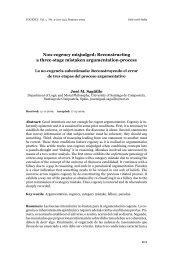Cogency v2 n2
Cogency v2 n2
Cogency v2 n2
Create successful ePaper yourself
Turn your PDF publications into a flip-book with our unique Google optimized e-Paper software.
Wittgenstein and the Logic of Deep Disagreement / D. M. GODDEN & W. H. BRENNER<br />
the opinions disputants share at the outset, they are limited by the shared<br />
framework (Weltbild) in which those opinions have meaning.<br />
To elaborate, Campolo (2005: 41) observes that reasoning, and therefore<br />
reasoning together, is an activity whose function is inherently reflective,<br />
reparative or remedial. The activity of reasoning is invoked when some<br />
other activity in which we are otherwise smoothly engaged is somehow interrupted.<br />
Like any other activity, reasoning is based in training. “[T]he path<br />
to expertise, competence, and intersubjectivity is paved with training, practice,<br />
study, apprenticeship, immersion in a tradition or way of doing something.<br />
Reasoning together, on its own, cannot bring about any of this – it<br />
first gets its foothold once all of this is already in place” (Campolo 2005:<br />
45). Thus, our ability to reason together successfully is dependent on our<br />
shared training – our enculturation into a form of life and attendant Wletbild.<br />
“[R]easoning together is not some sort of magically creative act that always<br />
produces efficacious results. It is rather a way of drawing on shared resources,<br />
and as those resources get thinner, reasoning loses traction” (Campolo 2005:<br />
41). Deep disagreements differ from normal disagreements in that they are<br />
characterized by a divergence, incongruity or other difference in the forms<br />
of life of the disputants. This difference limits both the availability and traction<br />
of rational resources in the resolution of deep disagreements, and<br />
thereby dictates that the operation of reason in deep disagreement will be<br />
characteristically different than in normal ones where there is no such limitation<br />
on the relevant rational resources.<br />
Lugg’s optimism fails to recognize the role played by the shared background<br />
commitments in determining the ‘resolution space’ of a disagreement,<br />
and because of this, as Turner and Wright (2005: 31) point out, it<br />
fails to recognize that two very different sorts of things are going on in normal<br />
as compared with deep disagreements.<br />
Fogelin’s point is not that what goes on in such dialectical free-for-alls<br />
cannot involve argument, or even that the resulting resolution cannot<br />
sometimes be represented as accomplished through nothing but serial<br />
arguments. It is that everything rests on how much is shared to begin<br />
with. And when that is not enough to resolve the conflict through the<br />
55








